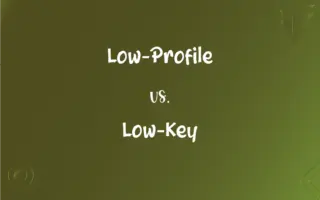Likelihood vs. Likeliness: What's the Difference?
Edited by Aimie Carlson || By Janet White || Published on January 27, 2024
Likelihood refers to the probability or chance of something happening, while likeness describes the state or quality of being similar or alike.

Key Differences
Likelihood and likeliness are both nouns that describe the chance of something occurring. However, likelihood is more commonly used in modern English, particularly in statistical or probabilistic contexts, to denote the probability or chance of an event. Likeliness, though similar in meaning, is less frequently used and can sometimes be seen as more archaic or literary.
The word likelihood implies a quantitative assessment of probability. It is often used in scientific, mathematical, or logical discussions where the probability of events is calculated or estimated. Likeliness, on the other hand, while also referring to the probability of something happening, is less likely to be used in a technical or mathematical context and more in general language.
In terms of usage, likelihood is often found in academic and professional writings. It's a preferred term in statistics and research for discussing the odds or chances of certain outcomes. Likeliness is more colloquial and might be used in everyday conversation or in literary contexts, where the formality and precision of likelihood are not required.
Both likelihood and likeliness can be modified by adverbs to indicate the degree of probability (e.g., high likelihood, low likeliness). However, the use of likelihood in such constructions is more prevalent, reflecting its wider acceptance and usage in contemporary English.
Likelihood and likeliness are synonyms and interchangeable in many contexts, likelihood is the more commonly used term, especially in formal and technical writing. Likeliness maintains a presence in the language but is less prevalent and tends to appear in more general or less technical discussions.
ADVERTISEMENT
Comparison Chart
Usage Frequency
More commonly used
Less commonly used
Context
Preferred in statistical, scientific contexts
More colloquial, literary contexts
Formality
Higher level of formality
Lower level of formality
Association with Probability
Directly associated with probability
Less directly associated with probability
Modifications
Often modified by adverbs (high, low)
Less frequently modified
ADVERTISEMENT
Likelihood and Likeliness Definitions
Likelihood
The probability of an event occurring.
The likelihood of rain today is high.
Likeliness
The state or quality of being likely.
The likeliness of a coincidence in this case is low.
Likelihood
The state of being likely or probable.
The likelihood of confusion is minimal.
Likeliness
The degree to which something is probable.
The likeliness of winning the lottery is slim.
Likelihood
The chance of something happening.
In all likelihood, the meeting will end early.
Likeliness
The potential for a particular outcome.
The likeliness of confusion in this situation is high.
Likelihood
A measure of how probable something is.
There's a strong likelihood of success.
Likeliness
A non-technical term for probability.
There's a certain likeliness that it might rain.
Likelihood
A statistical term for the probability of an event.
The likelihood function is crucial in this analysis.
Likeliness
The condition or quality of being probable or likely to occur.
Likelihood
The state of being probable; probability.
Likeliness
Likelihood, probability or chance of occurrence; plausibility or believability.
Likelihood
Something probable.
Likeliness
Suitability; agreeableness.
Likeliness
Likeness; similarity.
Likeliness
Likelihood; probability.
Likeliness
Suitableness; agreeableness.
Likeliness
The probability of a specified outcome
Likeliness
The chance or probability of something.
The likeliness of her arrival on time is uncertain.
FAQs
Is likeliness considered archaic?
Not entirely, but it's less modern than likelihood.
Is likelihood used in mathematical contexts?
Yes, it's commonly used in statistics and probability.
Does likelihood relate to statistical probability?
Yes, it's directly related to statistical probability.
Is likelihood more common than likeliness?
Yes, likelihood is more commonly used than likeliness.
Can likelihood and likeliness be used interchangeably?
Generally, yes, but likelihood is preferred in formal contexts.
Can likeliness be used in academic research?
It's less common but not incorrect in less formal academic research.
Do likelihood and likeliness have the same meaning?
Yes, they both refer to the probability or chance of something happening.
Is likelihood a technical term?
Yes, it's often used in technical, especially statistical, contexts.
Can likeliness be used in everyday conversation?
Yes, it's suitable for more colloquial, everyday use.
Is likelihood more formal than likeliness?
Yes, likelihood is generally more formal.
Are there contexts where likeliness is preferred over likelihood?
In literary or less formal contexts, likeliness might be preferred.
Can likeliness be found in historical texts?
Yes, it's more commonly found in older, historical texts.
Can likeliness be used in scientific writing?
It's less common, but it can be used in less formal scientific contexts.
Does likeliness imply a lower degree of probability than likelihood?
No, the degree of probability is the same; the difference is in usage.
Is likeliness a good choice for technical writing?
Likelihood is generally preferred in technical writing.
Is likelihood used more in British or American English?
It's widely used in both, but particularly prevalent in American English.
Are both words derived from the same root?
Yes, both are derived from the adjective "likely."
Is likelihood used in legal contexts?
Yes, it's often used in legal discussions regarding probability.
Do both terms have the same grammatical usage?
Yes, both are nouns and used similarly in sentences.
Is there a difference in modification (adverbs) between the two?
Likelihood is more commonly modified by adverbs like high or low.
About Author
Written by
Janet WhiteJanet White has been an esteemed writer and blogger for Difference Wiki. Holding a Master's degree in Science and Medical Journalism from the prestigious Boston University, she has consistently demonstrated her expertise and passion for her field. When she's not immersed in her work, Janet relishes her time exercising, delving into a good book, and cherishing moments with friends and family.
Edited by
Aimie CarlsonAimie Carlson, holding a master's degree in English literature, is a fervent English language enthusiast. She lends her writing talents to Difference Wiki, a prominent website that specializes in comparisons, offering readers insightful analyses that both captivate and inform.






































































